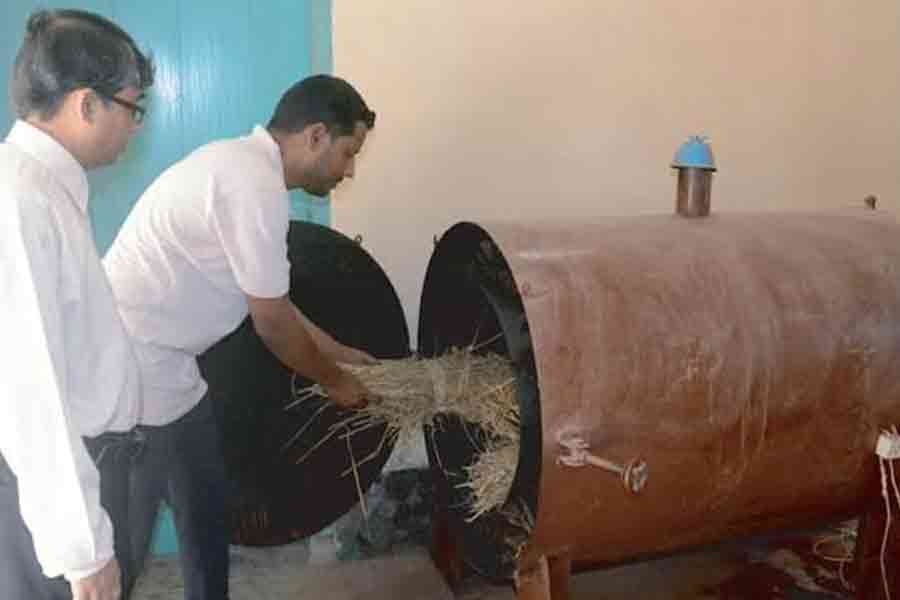
Published :
Updated :

As Bangladesh's population grows and the demand for food rises, efficient fertiliser use has become more critical than ever to safeguard food security. Farmers in the country rely heavily on chemical fertilisers and pesticides, a long-standing practice that has caused soil degradation, biodiversity loss, water pollution and contamination of the food chain. Researchers warn that overuse of fertiliser has become a pressing concern, reducing fertiliser efficiency, lowering farm profitability, and contributing to environmental damage, including greenhouse gas emissions.
Professor Shahla Hosseini-Bai of Griffith University, Australia, in collaboration with researchers in Bangladesh, is leading a project to understand farming practices in rice systems and identify sustainable strategies to improve fertiliser efficiency and increase yields. Sharing the research team's recent findings, she said many farmers apply extra fertiliser, believing it will boost yields. However, the study revealed that over-fertilisation not only failed to increase yields but also led to unnecessary expenses and environmental harm. Under-fertilisation, though less common, was also observed due to farmers' financial constraints.
To address these challenges, researchers are exploring innovative technologies to improve fertiliser efficiency. One promising approach, according to Professor Hosseini-Bai, is the use of biochar - a charcoal-like substance produced from agricultural residues and waste through pyrolysis, a process that involves heating in the absence of oxygen. Often referred to as "black gold" for soil, biochar offers a multitude of benefits, including enhancing soil health and fertility, promoting sustainable waste management and mitigating climate change.
Explaining its effects, Professor Hosseini-Bai said, "Biochar enhances soil's ability to retain nutrients and water, reducing the need for excessive fertiliser and irrigation. Its water-retention capacity is particularly valuable during drought. Because it is highly stable, biochar can remain in the soil for centuries, significantly increasing carbon storage."
Biochar also acts as a carbon sink by locking CO2 underground for hundreds of years. Its porous structure functions like a sponge, retaining moisture, micro-organisms, and essential nutrients such as nitrogen and phosphorus, as well as gases like carbon dioxide and nitrous oxide. Considering these benefits, the Intergovernmental Panel on Climate Change (IPCC) recognised biochar as a potential tool for climate change mitigation.
Despite its potential, biochar adoption remains limited by cost and accessibility. Professor Hosseini-Bai has developed both liquid and solid biochar-based fertilisers that are nutrient-efficient, reduce dependence on conventional inputs, and are effective across a wide range of crops. She notes that wider adoption is hampered by limited commercial production - an obstacle that could be addressed by introducing low-cost kilns into formal markets.
Her research also shows that combining biochar or other organic matter with fertilisers can substantially improve yields. Biochar's properties vary according to the feedstock and production method, allowing it to be tailored to specific soil conditions. Smallholder farmers can design their own kilns and produce biochar on-site. Farmers can also compost or mulch organic farm and household waste such as rice husks, straw, fruit scraps, or manure, and apply it alongside fertilisers for similar benefits. Even simple techniques, such as burying organic matter, igniting it, and covering it to limit oxygen, can make biochar production feasible in resource-scarce settings. However, organic matters like manure and straw are often used as fuel or livestock feed, which may limit their availability for soil improvement.
Unlocking biochar's full potential will require concerted action by government, researchers, and farmers. Public investment in production facilities, training programmes, and farmer support can accelerate adoption. At the same time, academic and research institutions can play a pivotal role in this regard by sharing knowledge, making research findings widely available, and establishing demonstration sites to showcase biochar's effectiveness in real farming conditions.


 For all latest news, follow The Financial Express Google News channel.
For all latest news, follow The Financial Express Google News channel.